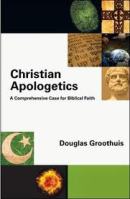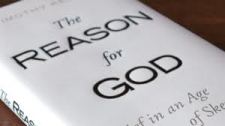This chapter of Groothuis’ Christian Apologetics shows how Jesus’ beliefs and actions in themselves are an apologetic for a high Christology. Since I cannot reproduce the whole chapter, here are some highlights:
Matthew tells of Jesus’ virgin birth, which means that he is fully human and fully God (his human origin was supernatural and God-ordained), but he did not inherit a sin nature (one of us, but beyond us). John Frame is quoted (and Acts 17:16-34; 1 Corinthians 1-2 and Colossians 2:8 are referenced) to dispel the rumor that his virgin birth is a copycat of other religions or mythologies. In particular, his birth is dissimilar to Buddha’s, as Buddha’s mother was not a virgin, Buddha was not considered supernatural, and that birth narrative was written 100s of years later.
Jesus is the transliteration of Joshua: Jehovah is salvation/Savior. Matthew and Luke (2:10-11) call him “Messiah, the Lord” — Messiah being a title meaning one is anointed by God. “The Lord” is not used of any OT priests, prophets or kings.
In the public eye, Jesus was a spiritual liberator from demons and death. Reversing death itself was one of Jesus’ most spectacular displays of authority, as was exorcism and healing (Acts 10:38) a display of his power over Satan.
“When Jesus makes reference to ‘sitting on his throne’ and rendering final judgment, he is indirectly claiming deity, since these prerogatives belong only to God according to Jewish Scriptures.” (p. 489) You can see his claims to deity in his “I AM” statements in John (6:48, 51; 8:12; 10:7,9, 11; 11:25; 14:6; 15:1, 5) (not sure why Groothuis does not include John 8:58). He displayed his authority in forgiving sins, proclaiming himself Judge, and speaking confidently.
Jesus was a master teacher. He did not defer to others (as a typical rabbi would), but spoke on his own authority and left many questioners speechless and amazed. The word he used frequently, “Amen” or “Verily” or “Truly” or “Solemnly” or “Believe me” or “I tell you this” or “Remember this” et cetera) points to his sense of authority, sincerity and certainty (p. 490). Pascal described his teaching this way: “Jesus said great things so simply that he seems not to have thought about them, and yet so clearly that it is obvious what he thought about them. Such clarity together with such simplicity is wonderful.” (p.482)
His basic worldview: God: “There is one God who is personal; knowable; worthy of adoration, worship, and service; separate from the creation ontologically but involved with creation through providence, prophecy, miracle and supremely in the life of Jesus himself.” (482) He had unique knowledge of God (Matthew 11:27, John 14:5-7). Humanity: Humans are God’s creatures, are more valued than animals and are spiritual beings with much to gain/lose spiritually, and are poisoned by sin. Ethics: The greatest commandment is to love God (faith saves, not works), and the second greatest flows from it: love your neighbor (the Other) as self.
And he practiced what he preached, interacting with the lowest class (tax collectors, sinners, women)–who happened to be very attentive to what he had to teach.
Now, this next piece–that Jesus was a miracle-worker–had me stumped, because Groothuis says Jews didn’t expect the Messiah to be a miracle-worker at the time of Jesus (so the disciples wouldn’t have invented that). That made me wonder why Jesus answered John the Baptist the way he did when John was in prison. I asked him and he said, “They were not expecting it, but Jesus showed that they should have been. He gave the proper–and logically defensible–understanding of the Hebrew Bible (Matthew 5-7).” But it just occurred to me, why did everybody keep asking Jesus for a sign, if they didn’t expect one? I just asked him that, and I’ll update this with his answer when I receive it.
Jesus received worship from others at his birth (Matthew 2:11), when he calmed the storm (Matthew 14:33), when he was risen (Matthew 28:1,9), by women (Matthew 28:17, Luke 24:52), and by the eleven.
His most frequent title he used in reference to himself was “Son of Man“, which carried strong divine and messianic connotations. There are several prophetic references in the Hebrew Bible specifically to the deity of the Messiah (Psalm 2:7-12; 110:1-2; Is. 7:14, Matthew 1:23; Is. 9:6-7; Micah 5:2; Jer. 23:5-6; Malachi 3:1).
“He faced his crucifixion not as an accident or a mistake, but as a necessary part of his mission.” (p. 495) “There would be no Christianity without his resurrection, which is central to the entire New Testament.” (p. 498)
John uses the word “Logos” to refer to the personal God of the universe who has taken on human nature to conquer sin.
Jesus is Savior, not a mere sage. He is the incarnation of God, not a mere avatar. And he is the Messiah, not a mere prophet.
All of the above considered, he said the “Law and the Prophets” spoke of him, giving them his stamp of divine approval. He says “Scripture cannot be broken” (John 10:35, 17:17). He did not come to abolish it, but fulfill it (Matthew 5:17-19; Luke 16:7, 24:25-27; John 5:9). He gave its proper interpretation to overcome temptation (Matthew 4:1-11, Luke 4:1-13) and correct the false shepherds (who nullified it through their human tradition, Matthew 15:1-6). “Jesus equated the Hebrew Bible with the very words of God, as when he said that David’s writing in Psalm 110 was through the Holy Spirit (Mark 12:35-36).” (p. 504)
The NT is a good source of knowledge about Jesus: “The apostles were personally commissioned by Jesus (Luke 6:13; Acts 9; Galatians 1:1), had unique historical experience with Jesus (Mark 3:14; John 15:27) and were given special inspiration as specially designated emissaries of Christ (e.g., 1 John 1:1-3; 2:7, 24; 1 Peter 1:22-25; 2 Thess. 3:6-15). This authority was recognized by the ancient church as the basis of their beliefs and practices (see Acts 2:42).” (p. 505)
A word on “inspiration” — “God, who cannot err, directed the writers of the Bible to write what God intended them to write, and to do so without any kind of error–logical, historical, scientific or moral.” (p. 504)
(discussion index)
Encourage:

-
Recent Posts
-
Past President of The Christian Apologetics Alliance

Apologetics Daily

my goodreads profile

Categories
- Apologetics
- Apologetics Toolbox
- Epistemology
- Ethics & Metaethics
- God Particle
- Groothuis' 'Christian Apologetics'
- Keller's Reason for God
- Ontological Argument
- Predestination
- Richard Dawkins
- Sam Harris
- Stephen Law's evil god argument
- Testimonies
- Tim McGrew
- Undesigned Coincidences
- William Lane Craig
- Youth Apologetics
- Bible Narrative Project
- Carnival
- Examiner.com Articles
- Freelancing Tips and Tricks
- Inventions
- Memories
- Neighboring
- News
- Poetry and Fiction
- Random
- Reviews and Interviews
- Apologetics
Archives
Meta









